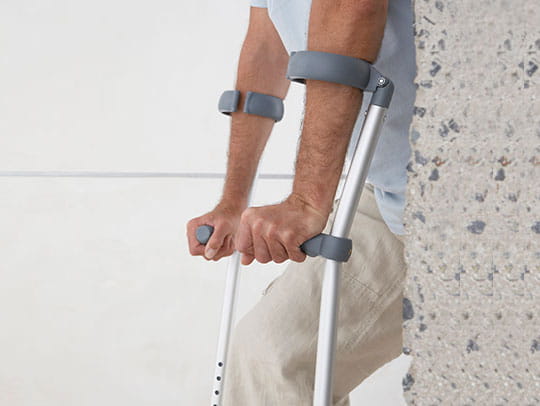
Hip replacement surgery
What is hip replacement?1
Hip replacement is a type of surgery to replace damaged parts of the hip with man-made parts. The most common reason for a hip replacement is to treat osteoarthritis of the hip.
Hip replacement is usually recommended to treat severe pain or disability and when other treatments have not helped. A hip replacement can reduce pain, improve mobility and improve quality of life.
There are two types of hip replacement – partial and total.
- A partial hip replacement only replaces the ball on the end of the thigh bone.
- A total hip replacement means the ball of the thigh bone and the hip joint socket are both replaced.
The medical term for hip replacement is hip arthroplasty.
Skip straight to:
Public and private hospital options
It’s important to understand how getting your procedure in a public or private hospital differs.
| Question | Public system (Without health insurance) | Private system (With health insurance) |
|---|---|---|
| Will I avoid public hospital waiting lists? |
No. |
Yes. |
| Will I be able to choose my hospital? |
No. |
Yes. |
| Will I be able to choose my doctor or surgeon? |
No. |
Yes. |
| Will I have out-of-pocket costs? |
No. |
Yes. |
What’s covered in a public hospital?
In a public hospital, hip replacement surgery is covered by Medicare for eligible residents.
Once you are discharged from hospital, you may still need to pay out-of-pocket for things like medicines and physiotherapy.
What’s covered in a private hospital?
In a private hospital, private health insurance can cover some costs of hip replacement surgery.
You may have an out-of-pocket cost if you use private hospital cover when you get treatment. You can minimise some of these costs by choosing a hospital and specialist that have agreements with your health insurer. If you have an excess on your cover, you will have to pay for that out of pocket.
What is hospital excess?
Hospital excess is the amount of money you contribute upfront (out of your own pocket) before you can claim a benefit on hospital treatment. With HBF hospital cover, you choose a set excess option when you first get hospital cover, but you can change your excess at any time.
With HBF, you only pay hospital excess once per person, per calendar year (to a maximum of twice on a family policy) when you’re admitted to hospital.
Are you an HBF member? You can check your excess in myHBF or the HBF App. This is the set amount you’ll pay when you’re admitted.
What is an out-of-pocket cost?
A hospital out-of-pocket cost is the portion of a hospital bill that you pay from your own pocket for which you won’t be reimbursed – by either health insurance or Medicare.
How to find HBF health cover for a hip replacement surgery
If you want private health insurance cover for hip replacement surgery, look for HBF hospital cover (not extras cover) that includes a category called ‘Joint replacements’.
You need to hold hospital cover that includes Joint replacements for two months before you can claim for hip replacement surgery (or 12 months if you need hip replacement surgery due to a pre-existing condition such as osteoarthritis).
Ask your GP for an open referral
Your GP is the one who’ll most likely refer you to a specialist – but they may not recommend the specialist you’d want to perform your surgery. Asking for an open referral can let you:
- Choose your own specialist.
- Find a specialist with good availability who can perform treatment at the hospital you prefer.
- Find a specialist that you trust to perform your surgery.
- Find a specialist with minimum out-of-pocket expenses for you.
Find an orthopaedic surgeon with minimum out-of-pocket costs
To find orthopaedic surgeons who work with HBF, just search for ‘orthopaedic surgeon’ in our find a provider tool.
- Look for the “Full Cover” tick mark or “Access Gap Cover” tick mark.
- These specialists will help minimise your out-of-pocket cost.
If you’ve already started working with a specialist
If you’ve already got a specialist, ask them these questions:
- Do you have a Full Cover or No Gap agreement with HBF?
If they don’t, you may need to consider if their fees work with your budget. - What hospital(s) do you operate in?
You can then check if the hospital has a Full Cover or No Gap agreement with HBF.

Signs you might need a hip replacement1
Hip replacements are usually only considered if lifestyle changes, medicines and other treatments like physiotherapy are not helping.
Here are some signs that your hip may need some kind of treatment:
- Severe joint damage from osteoarthritis or rheumatoid arthritis.
- Hip pain that has lasted a long time and makes moving difficult.
- Hip pain that makes it difficult for you to look after yourself and is affecting your daily activities.
- Hip pain that doesn’t improve with rest, physiotherapy or medications.

How long does a hip replacement last?1
Hip replacements usually last 15 years or more.
All joint replacements eventually need to be replaced. The younger you are when you have the hip replacement, the more likely you are to need revision surgery.
Ensuring you follow exercise recommendations and maintain a healthy weight will help increase the lifespan of the new hip.

Hip replacement recovery1
Most patients leave hospital a few days after hip replacement surgery. For a few weeks following surgery, crutches, a cane or a walking frame are usually needed.
After about 3 months you should be able to do most of your normal activities. Typically, joint strength and flexibility gradually recovers over a 12-month period. Seeing a physiotherapist and doing the recommended rehabilitation exercises can help speed up recovery.
Private health insurance can help with physiotherapy costs too, if you get extras cover that includes physiotherapy.
- Pain medications.

Alternatives to hip replacement2
Depending on your individual circumstances you may be recommended to try a combination of the following before considering a hip replacement;
- Non-impact or low-impact exercise.
- Weight loss.
- Physiotherapy.
- Pain medications.
The GLA:D Program ®

Reduce hip osteoarthritis symptoms and move more confidently with this evidence-based program that uses in clinic group exercise and education sessions delivered by a trained physiotherapist. Eligible HBF members get access at no cost.
View programOsteoarthritis Healthy Weight for Life

Get help managing knee and hip osteoarthritis symptoms with a guided 18‑week program which supports weight loss, increased mobility and better pain management. Eligible HBF members get access with no cost.
View programLooking for health insurance? Get a quote in minutes
Compare our hospital and extras cover options now. Or use our Health Insurance recommendation tool to select your needs and find our most affordable cover to suit.

Further reading


